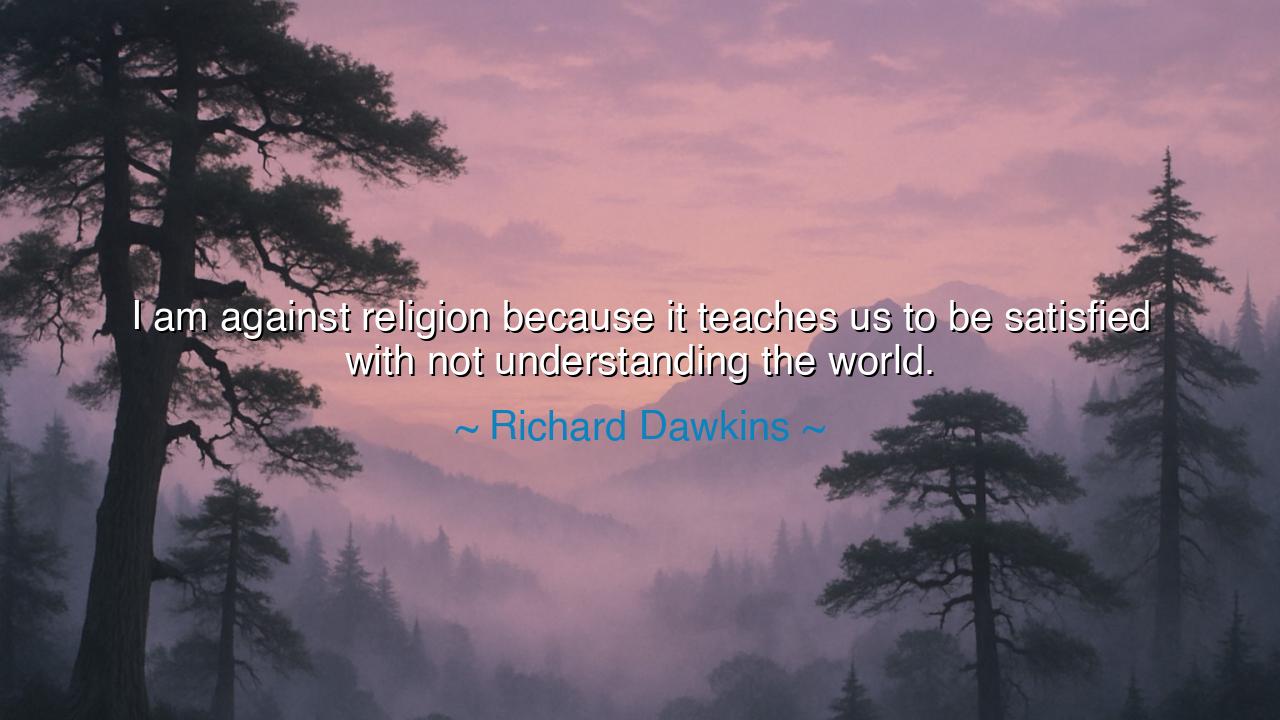
I am against religion because it teaches us to be satisfied with
I am against religion because it teaches us to be satisfied with not understanding the world.






"I am against religion because it teaches us to be satisfied with not understanding the world." These words, spoken by the eminent evolutionary biologist Richard Dawkins, challenge us to confront the limitations that religion, as it is often practiced, places upon the human quest for knowledge. The essence of his critique lies in the idea that religion, in its more dogmatic forms, encourages individuals to accept answers without questioning, to embrace mystery and faith rather than reason and inquiry. For Dawkins, the danger of religion is not in its potential for good, but in its capacity to stifle the drive to understand the universe through science, reason, and the pursuit of truth.
The origin of this perspective can be found in the very spirit of ancient philosophy. The Greeks, from Socrates to Aristotle, celebrated the importance of questioning the world around them. Socrates famously said, "The unexamined life is not worth living." For him, the path to wisdom was not one of passive acceptance, but active engagement with questions, with the world as it is, and with the nature of existence itself. It is this same drive to understand — to explore the mysteries of the universe without relying on unverified beliefs or inherited dogmas — that Dawkins champions. To be satisfied with ignorance, to relinquish our curiosity to a preordained system of thought, is, in his view, to surrender the very essence of what makes us human.
Consider the life of Galileo Galilei, a man who defied the teachings of the church in his quest to understand the heavens. Galileo's discovery of the heliocentric model — the idea that the Earth revolves around the Sun — was met with fierce opposition by religious authorities. Yet Galileo, like the ancient philosophers, refused to be satisfied with mystical explanations that could not be tested or observed. His story is one of courage in the face of oppression, and of defiance against a system that sought to halt the advancement of knowledge. His famous quote, “E pur si muove” (And yet it moves), reflects the unyielding human spirit to pursue truth and understanding, even when faced with forces that seek to suppress it.
In contrast, many religious systems, throughout history, have encouraged followers to accept the mysteries of life and the cosmos as the will of a higher power, to remain content with explanations that do not require the rigor of evidence or the testing of ideas. The very concept of faith, in many religions, is built on the belief that not everything can be known — that the divine transcends human understanding. While there is value in humility and recognition of our limits, Dawkins warns that this satisfaction with mystery can lead to the stagnation of human progress. Instead of questioning and seeking deeper answers, many have been taught to simply accept the world as it is presented to them, without challenge or exploration.
This tension between faith and reason has long existed. In the Middle Ages, the church held immense power over the pursuit of knowledge, and to question religious dogma was to risk persecution. Think of the Inquisition or the treatment of Giordano Bruno, a philosopher and scientist burned at the stake for his views on the nature of the universe. The tension was clear: the church sought to impose a spiritual framework upon all aspects of life, while thinkers like Bruno and Copernicus sought to understand the world through observation, experimentation, and rational inquiry. Their ultimate contributions to science shattered long-held views and opened the door to new understandings, yet they faced great opposition from those who, for centuries, had been content with a static, dogmatic view of the world.
Dawkins’ critique, then, is not simply an attack on religion, but a plea for a life of inquiry, a life of active engagement with the world around us. He calls us to embrace the same curiosity that fueled the great minds of history — minds like Darwin, Einstein, and Curie, who all sought to understand the mysteries of nature. For Dawkins, the pursuit of truth and knowledge is not a mere intellectual exercise; it is a moral imperative. To live in ignorance, to reject the power of reason and the insights of science, is to limit the potential of humanity itself. Our destiny, in this view, is not to be found in the passive acceptance of mysteries, but in the active pursuit of answers.
The lesson here is simple yet profound: do not settle for easy answers or comfortable mysteries. Embrace inquiry, and never allow yourself to be satisfied with ignorance. Life’s complexities are not beyond us, and the universe, vast and beautiful as it is, can be understood through the tools of reason, scientific exploration, and critical thinking. Just as Galileo looked at the heavens and dared to question the earth-centered view of the universe, so too must we look at the world around us with the same courage, the same unrelenting drive to seek the truth. Understanding is the path to freedom, and science and reason are the keys to unlocking that truth. Live with the spirit of exploration and let the light of knowledge guide your way.






AAdministratorAdministrator
Welcome, honored guests. Please leave a comment, we will respond soon